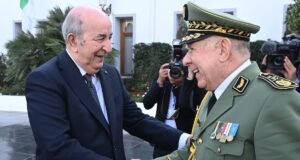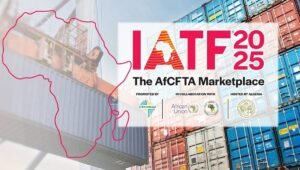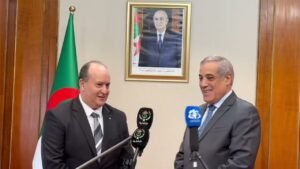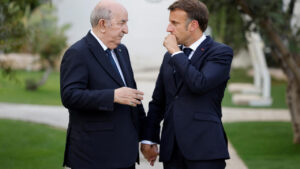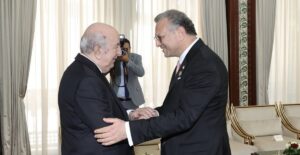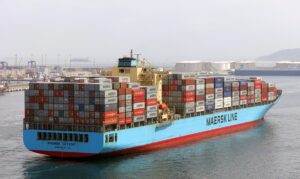Does the Algerian regime have a chance to confront the Moroccan economic "tide" in Africa?

Social media has been abuzz in recent days with a wave of mockery over a video of an Algerian official making a payment at a store using his bank card. The mockery focused primarily on the event itself being considered a topic worthy of documentation and promotion, with some even calling it a celebration of Algeria's finally achieving card payments, despite the technology having been known around the world for decades! But beyond the mockery, the event highlights the difficulty of transforming the Algerian economy into an open, vibrant, and modern one, from its current closed "socialist" model, where the executive branch controls every aspect of it and allows it to open up to citizens only "point by point." This is especially true given that the officials tasked with modernizing this economy themselves require a process of "updating and upgrading" their knowledge, skills, and economic and political approaches, given that most of them are over seventy years old, having spent their entire life within this "closed" economy, connected to the world only by oil exports. It is true that paying with bank cards did not start with the “video owner” process, but it is certainly new (dating back a few years) to the point that it is basically a subject for photography!!
But what does the novelty of bank card payments and the intention to introduce mobile payments have to do with the title of the article, and more specifically, with competition with the “eternal enemy of the Algerian regime”: Morocco? Morocco’s accession to the African Union and King Mohammed VI’s decision to abandon the “empty seat” policy in 2017 followed a series of preliminary events led by him, who initiated visits to more than thirty African countries over more than fifty visits, during which he inaugurated projects that embody his philosophy of South-South cooperation, based on a win-win approach. These visits were not limited to Morocco’s traditional allies in the western part of the continent, specifically French-speaking countries, but also included, for the first time, countries in the eastern, central, and southern parts of the continent, most of which speak English and Portuguese. This Moroccan economic openness to the continent did not pass through the gateway of Moroccan government investments, but rather through leading private sector companies, which qualified it, within a few years, to become the largest African investor in the West of the continent (its vital environment), and the second largest investor in the entire African continent. It is rapidly heading towards displacing South Africa from the top spot, whose investments are generally concentrated in its immediate surroundings in the South of the continent.
Thus, Moroccan investments have spanned more than 32 African countries, concentrated primarily in the banking sector (Banque Populaire, Attijariwafa Bank, and Bank of Africa); telecommunications (Maroc Telecom); aviation (Royal Air Maroc); phosphates (Office Chérifien des Phosphates); insurance (Saham, Wafa Assurances); mining (Managem); and other companies operating in the energy, construction, and holding sectors. Accordingly, 631 million Moroccan investments over the past ten years went to sub-Saharan Africa, with 311 million investments in the banking sector, 211 million in the telecommunications sector, 121 million in the industrial sector, 111 million in the real estate sector, 101 million in holding companies, 91 million in miscellaneous services, 51 million in trade, and 11 million in insurance. This diversity and spread of Moroccan investments across most countries on the continent varies between private sector investments (in approximately 32 countries) and technical, technological, and economic cooperation programs (in approximately 15 other countries). This leaves only six African countries (Algeria, South Africa, Zimbabwe, Namibia, Botswana, and Lesotho) outside the circle of mutual benefits—for now—due to their regimes' positions on the Moroccan Sahara. Despite these tense positions, Morocco continues its openness to these countries, calling for a focus on economic relations that benefit the peoples of the continent. This was embodied by its commitment to inviting four countries from southern Africa, which remain stubborn on the Sahara issue (Zimbabwe, Namibia, Botswana, and Lesotho), to attend the launch of the project "Developing Regional Value Chains for Automotive and Electric Mobility," signed between Morocco, the Democratic Republic of the Congo, and Zambia. The project aims to establish a global hub for the manufacture of electric vehicle batteries in the region, as an alternative to exporting raw battery components. This project represents an exceptional development in southern Africa. The same applies to the project of the Somagec company to build power transmission lines from the Republic of Angola to the mining areas of the Democratic Republic of Congo and Zambia, which is mutually beneficial for the African countries involved. This focus on the south of the continent by private Moroccan investors is likely to bring about a qualitative shift in these countries' political relations with Morocco, accelerating the process of withdrawing their recognition of the phantom republics, thus leaving Algeria and South Africa alone for the time being. It is likely that South Africa's positions will change if the countries of its southern region disintegrate in favor of Moroccan territorial integrity, so as not to remain isolated, which will lead the country of the generals to their inevitable fate: complete isolation within the African continent!
Given this multi-faceted Moroccan penetration, without even mentioning the many supportive areas such as sports, imam training, peacekeeping missions, expertise exchange, transcontinental projects (the Nigeria-Morocco gas pipeline, the initiative to break the isolation of the Sahel countries, and the initiative to establish NATO), and many others, how can a regime that has lost its legitimacy and expired resist by opening a branch of an Algerian bank in this or that country, when they have barely discovered the benefits of using bank cards for payments?!!! And can they rely more on the "policy of checks," especially with the decline in the number of "long-lived" regimes on the continent, and the transfer of power by young leaders who understand only the language of interests?!
Algeria's reliance on a single resource, oil and gas, none of which goes to African countries, is enough to doom the "illusion" of the influence of Africa's "striking force" to decline and disappear, especially with the fluctuation of this material's prices and the mismanagement of the resources that come from it, not to mention the closed nature of the Algerian political and economic system, which condemns the Algerian private sector to limitations and inability to confront the Moroccan tide in Africa, no matter how much President Tebboune exaggerates in "drumming" to increase his country's "fake" exports outside the hydrocarbon sector, and Algeria's occupation of the third place in Africa as the largest economic power. The figures available to the rest of the countries, experts and observers of the world say the exact opposite, and condemn all the stupid "tricks" of the military regime to failure in advance!
In conclusion, the only way to preserve Algeria's resources and maximize the benefits they bring to the Algerian people is through regional cooperation, first and foremost by reviving the Arab Maghreb Union, even if Morocco retains its leadership for years to come. Without this Maghreb unity, waste will continue to characterize efforts to harness Algeria's wealth, and regional trade and economic exchange will be paralyzed.
